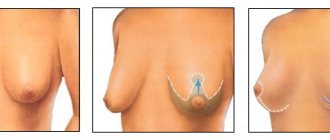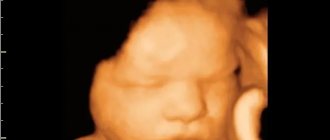What are the dangers of late pregnancy?
Let's talk about the problems that an older primigravida woman and her baby may face.
Consequences of late pregnancy for mother
Deterioration of your health. Patients over 30 usually have chronic diseases that worsen during late pregnancy. Ladies with thyroid dysfunction, cardiovascular system problems, musculoskeletal problems, diabetes mellitus, and poor eyesight are at risk.
Difficult birth with consequences. With age, tissues, including the cervix, lose elasticity. As a result, it cannot open fully during childbirth. Prolonged labor with ruptures is a common complication of late pregnancy.
It is harder for you to recover after childbirth. Adult mothers have a harder time recovering from childbirth than younger ones. Rehabilitation after a cesarean section is more difficult: bleeding, infections and inflammatory processes are common.
It is more difficult to establish lactation. Children of mature mothers are often transferred to artificial feeding at 2-3 months due to insufficient milk or its absence.
Hormones are a provoking factor. After the age of forty, male hormones are produced more actively, which leads to the growth of the endometrium. This prevents the fertilized egg from attaching to the wall of the uterus, which is fraught with developmental pathologies in the fetus. If the egg is defective, the risk of abnormalities increases.
You risk giving birth to a child with a disability. Older mothers more often give birth to children with pathologies and genetic abnormalities. Therefore, pregnant women are recommended to undergo tests to identify them. It is possible that after such a diagnosis you will be faced with a choice - to keep the baby or not.
Risks for the baby
Firstly, genetic abnormalities, developmental defects. Among them are Down syndrome, defects of the heart, neural tube, digestive and skeletal systems.
Secondly, hypoxia and its consequences. Due to poor dilatation of the cervix, the baby cannot pass through the birth canal - the head compresses the umbilical cord, and asphyxia occurs. Its consequences are terrible: disability, death of the baby. Hypoxia is the cause of a special neurological status of children, for example, cerebral palsy, delayed mental and speech development.
Thirdly, the psychological moment. Your child may face pressure and incorrect reactions from others.
What pathologies can a child develop:
In addition to the risks for the mother, late pregnancy also poses risks for the baby. 1. Chromosomal abnormalities. The child has an increased risk of developing Down syndrome: if at the age of 30 the child's mother has a risk of developing Down syndrome 1 in 950, then at the age of 45 the expectant mother in the child has a risk of developing Down syndrome is 1 in 30. 2. Non-chromosomal disorders. The risk of having a child with a heart defect increases. 3. Stillbirth.
4. Premature birth and the development in this regard of such diseases in the child as: problems with hearing and vision, cerebral palsy, susceptibility to infections, bleeding in the brain, impaired glucose levels and other serious problems.
Despite the risks, many mothers have children at a late age, and this also has its advantages: emotional and financial stability of the family, such children receive more attention, love, patience and devotion from their parents, parents are more conscious about their upbringing.
Gynecologists at the NATALI-MED medical center advise women to eat right, exercise, lead a healthy lifestyle, maintain normal weight, take vitamins and minerals, folic acid, and also follow all the recommendations of a good gynecologist in Strogino in order to prepare for pregnancy and bear a healthy baby.
What are the chances of conceiving
Be prepared for the fact that your chances of getting pregnant quickly decrease with age. If girls under 30 succeed within 4 months of regular attempts, then later, at best, it will take from six months to a year. Which is explained by the state of health and functioning of the reproductive system.
There are several factors on which conception depends. Here they are:
- Normal structure and thickness of the endometrium - this is the only way the embryo will attach to the wall of the uterus;
- Healthy fallopian tubes are clean, passable, fully functioning;
- The presence of ovulation is the main condition for the onset of late pregnancy;
- State of women's health. Fibroids and endometriosis can lead to infertility or make fertilization difficult. Age-related changes also aggravate the situation: the uterus is no longer so susceptible to hormones, and blood circulation in the pelvic organs worsens;
- Functioning of the thyroid gland. If you have thyroiditis, there may be problems with fertilization. With this diagnosis, the body produces antibodies that affect the ovaries - they do not work properly and fade away.
Any malfunction in the body can cause late pregnancy loss.
The role of the ovarian reserve
Another important factor is ovarian, or ovarian reserve. It refers to how many healthy eggs are in the ovaries. They are laid in a girl during the period of intrauterine development, and with the onset of her first menstruation, the eggs are “used up” every month. Their number also decreases after illness or stress. Therefore, with age there are fewer and fewer of them. The quality of the eggs that remain deteriorates: they develop genetic “breakdowns” and other mutations. Ovarian reserve declines sharply around age 35.
Some women are diagnosed with premature ovarian failure. This means that a girl, even at 25 years old, may no longer have an ovarian reserve and in a couple of years she will begin menopause. At the same time, a woman over 35 may have a sufficient supply of eggs for a late pregnancy.
Preparing for late pregnancy
Women who decide to become mothers for the first time in adulthood need to take planning seriously.
Step No. 1 - examination by specialists
See a therapist. He will assess your general health, predict possible complications during pregnancy, and give referrals to specialists.
The gynecologist will assess the condition of the reproductive system. If necessary, he will refer you for an ultrasound or laboratory test.
A cardiologist will check the functioning of the heart, an angiologist will assess the condition of the blood vessels and the likelihood of developing varicose veins during late pregnancy.
During the gestation period, any infections are dangerous. Visit an otolaryngologist and dentist. The first will reveal inflammatory processes, the second - diseases of the oral cavity.
A proctologist will help minimize the appearance of hemorrhoids during late pregnancy.
The ophthalmologist will evaluate visual acuity and the condition of the retina. During pregnancy and lactation, eye strain increases, especially in expectant mothers over 30 years of age.
Genetics recommend visiting couples in which the woman is over 35 and the man is 40 years old. A comprehensive medical examination will show whether conception is possible in your case, whether you can carry a child to term, and whether there are any contraindications to late pregnancy.
Step No. 2 - undergo treatment
At the planning stage, cure any identified ailments if possible. This is especially true for inflammatory lesions in the throat (for example, tonsillitis), caries. If the disease is chronic, undergo a course of maintenance therapy.
Step No. 3 - change your lifestyle
Review your diet. Exclude unhealthy treats, include cereals, vegetables, fruits, herbs. Drink more water. Give up bad habits.
Start playing sports. If you were far from it before, start small: walking, yoga. If you are an athlete, on the contrary, slow down: you are allowed moderate physical activity. They should not deplete the body.
Get enough sleep. A woman needs to sleep 8 to 9 hours a night to maintain her fertility at a good level. If you suffer from insomnia, talk to a therapist or neurologist - the doctor will prescribe safe sedatives.
Step #4 - Take Vitamins
Before late pregnancy, start taking folic acid, a vitamin complex for those planning to conceive and pregnant women. Vitamins will lay a good foundation for the health of the unborn baby.
How to prepare properly
Pregnancy at a late age is a completely natural process, and there is no need to treat it as a disease. If you feel well, do not have chronic diseases, pathologies, etc., then you do not necessarily need to be under the constant supervision of a gynecologist, much less stay in the hospital. But in order to be sure of a successful outcome, it is better to prepare for conception, pregnancy and childbirth in advance. For example:
- Get a full medical examination. First of all, see a gynecologist to assess the health of your reproductive system. Pay special attention to your endocrinologist to improve your hormonal balance before pregnancy. If necessary, take a course of medications prescribed by your doctor. Cure your teeth, check your blood sugar and hemoglobin levels. If you have previously experienced pressure surges, be sure to consult a cardiologist.
- Change your lifestyle. We are talking about the usual diet, sleep patterns, giving up bad habits. Drink more water, spend more time outdoors, try to take care of your nerves.
- Introduce physical activity into your life. If you haven't exercised before, moderate walking, jogging, yoga or Pilates will suffice. These classes will help you put your emotional background in order, find inner balance and become more resistant to stress.
- Be sure to consult a geneticist, especially if there are cases of hereditary diseases in your family. During pregnancy due to IVF, it is advisable to undergo PGD - preimplantation genetic diagnosis. It allows embryos to be analyzed for chromosomal abnormalities, monogenic diseases or chromosomal translocations. After a specialist’s conclusion, healthy embryos are selected for transfer, with no risk of abnormalities.
Don’t be afraid of the numbers in your passport and think about the bad. Modern medicine allows you to minimize all risks, manage your pregnancy carefully, and give birth to a full-fledged healthy baby. The mother is required to have faith in success, adherence to medical instructions and a positive attitude. And online courses from our school “Easy Childbirth” will help you prepare physically and psychologically for childbirth, postpartum recovery, and caring for your baby. Experienced practitioners will consistently tell you how easy it is to bear a pregnancy, give birth gently and painlessly, and discover the happiness of late, but long-awaited motherhood.
Did you like the post? Share it on social networks!
Telegram
Tweet
We recommend that you read similar articles:
- What to take to the maternity hospital? List of things for expectant mothers
- Exercises for pregnant women: gymnastics by trimester
- Ultrasound during pregnancy: when and why to do it?
Features of late pregnancy after 30 years
A woman under 32 has every chance of conceiving quickly. Provided there is good general and women's health and sufficient ovarian reserve, this will happen within a year with a 75% probability. As you get older, this becomes much more difficult.
Pay attention to an important point - menopause. He's getting younger. Therefore, if you are thinking about conceiving, ask your mother when she started menopause. If you are 43 - 45 years old, you should hurry up. Usually the onset of menopause is transmitted genetically from mother to daughter.
Difficulties during pregnancy
The main difficulties for expectant mothers at 30 and a little older begin when the woman is already pregnant.
Immunity drops immediately. The older the body, the more difficult it is for it to fight viruses and infections. Expectant mothers over 30 years of age are more likely to develop ARVI, which can negatively affect the fetus, especially in the first trimester.
Another nuance of late pregnancy is the exacerbation of chronic diseases and the development of gestational diabetes. Possible consequences are placental abruption, miscarriage, pathologies of fetal development, the birth of a premature or dead baby.
For adult women in labor, a cesarean section is often indicated. It is more difficult to recover from it. If a woman gives birth naturally, ruptures occur due to poor tissue elasticity.
Late pregnancy after 35 years
The older the expectant mother, the more difficulties with fertilization and pregnancy increase.
A sharply reduced ovarian reserve reduces the chances of conception. Therefore, it makes sense to consult a gynecologist and determine your ovarian reserve. Modern technologies make it possible to find out such information.
Fertility is also affected by the state of the reproductive system. Women are diagnosed with fibrous tumors and endometriosis - they affect the ability to conceive.
Another factor is the functioning of the hormonal system. Failures and age can become a serious barrier to motherhood.
The expectant mother faces the following complications of late pregnancy:
- Health problems. Blood pressure rises and diabetes develops almost 5 times more often than in younger mothers. Older pregnant women suffer more severely from toxicosis and are more often diagnosed with gestosis in the 2nd trimester;
- Complications of late labor. Post-term or premature late pregnancy, premature rupture of amniotic fluid, placental abruption, weak labor, miscarriage in the 1st trimester, caesarean section - these are the difficulties an older primipara may face;
- The baby is in critical condition. Hypoxia, disability, genetic abnormalities, congenital developmental pathologies - we have already talked about this complication of late pregnancy.
If you want to become a mother, plan ahead to minimize negative aspects.
Late pregnancy at 40 - 45 years old
It is most difficult for a woman aged 40 or older to become a mother due to the low content of healthy eggs. In women aged 40-41, their number is up to 10%, and in women aged 42 – only 1%.
At 40 - 42 years old, the chances of getting pregnant within a year are 40 - 50%. Over the next year they sharply decrease to 1 - 2%. By this age, the supply of eggs is almost exhausted, so fertilization is unlikely. At an even older age, it’s a miracle.
Difficulties of late pregnancy in adulthood
High chance of miscarriage. For women over 40 years old it is 34%, over 43 – 53%.
The likelihood of having a baby with Down syndrome. For mothers over 40 it is 1:110, and for mothers aged 43-45 it is 1:30.
General complications. Chronic ailments may worsen, new diagnoses may appear, and pregnancy and childbirth may be more difficult.
To minimize negative forecasts, you need to carefully prepare and tune in for the best.
Let's understand the terms
In Russia, over the past few decades, there has been a tendency towards having children in adulthood or towards late motherhood.
This fashion came to our country from the West, where the decision of a married couple to have children after 35 years is considered quite normal. However, the reasons to give birth in adulthood include not only the desire to establish yourself financially and socially, but also women’s health problems caused by difficulties in fertilization and subsequent gestation. Often, late pregnancy is the first and the decision to have a child at 35+ is always a conscious one. In the Middle Ages, late pregnancy was considered to be gestation occurring after 20 years, which is associated with a short life expectancy (30 - 40 years). In the USSR, pregnant women aged 26 or more were called old-timers. In the 90s of the last century, this border in Russia moved to 28 years, in the 2000s to 30. To call women who decided to become mothers at 35+ old-timers is rude and incorrect, taking into account the WHO criteria, according to which a person under 44 years of age age is considered young. The terms “advanced pregnant woman” or “mature pregnant woman” are considered more acceptable.
The optimal age for the birth of the first child, according to psychologists and obstetricians, is considered to be between 22 and 28 years. But carrying a pregnancy and giving birth in adulthood not only reduces the risk of endometrial cancer and ovarian cancer, but also softens the course of menopause and reduces the likelihood of developing osteoporosis.
In addition, late children are characterized by higher intelligence, good physical health and emotional stability.
Psychological aspect of late pregnancy
Before conception, you had a way of life that will have to change when the child is born. This can provoke depression, apathy, and stress.
Another point is pressure from society. Be prepared for the fact that someone will admire you, and someone will condemn you. Don't listen to anyone - do as your heart tells you.
If you are over 30, your parents are probably already elderly. Therefore, you can’t count on their help - caring for the baby will fall on your shoulders. This may be difficult.
What to do during late pregnancy
Attend antenatal clinic regularly. The gynecologist will refer you for tests - take them.
Control your weight. The doctor will calculate the recommended weight gain based on your initial data (weight and height). Stick to it.
Don't burden yourself. Late pregnancy is already a huge burden on the body. Take care of yourself, don't overwork yourself. Rest after physical activity.
Scheduled screenings
Get routine screenings - ultrasound, blood tests for genetic abnormalities. Your gynecologist will refer you for these examinations.
Prenatal diagnosis is carried out twice - from the 11th to 13th and 16th to 20th weeks. They do an ultrasound and take a blood test. The data obtained is entered into a program that calculates the risks of having a baby with chromosomal abnormalities.
If the chances are high, the couple is referred to a geneticist. He gives a referral for amniocentesis. During the procedure, the amniotic sac is punctured, amniotic fluid is removed and its cells are examined. Diagnostics provides reliable information about the genetic health of the fetus, but in 2% of cases it is fraught with miscarriage.
If the results are disappointing, the couple is advised to terminate. If the diagnosis was carried out closer to the 20th week, making a choice is very difficult and painful, because by this time the woman already feels the baby’s movements.
But it is necessary to undergo examinations for genetic pathology of the fetus during late pregnancy. Unless you decide to have the baby anyway.











